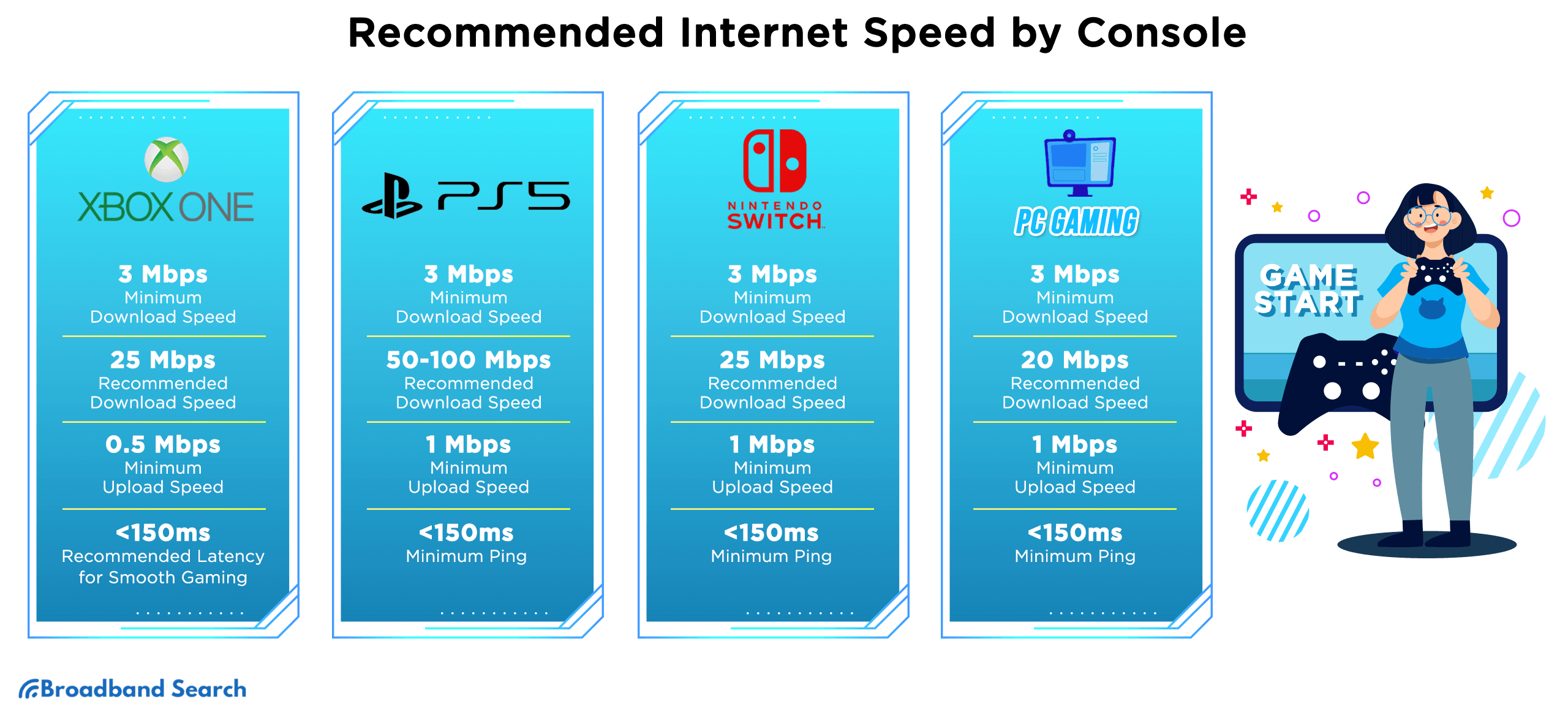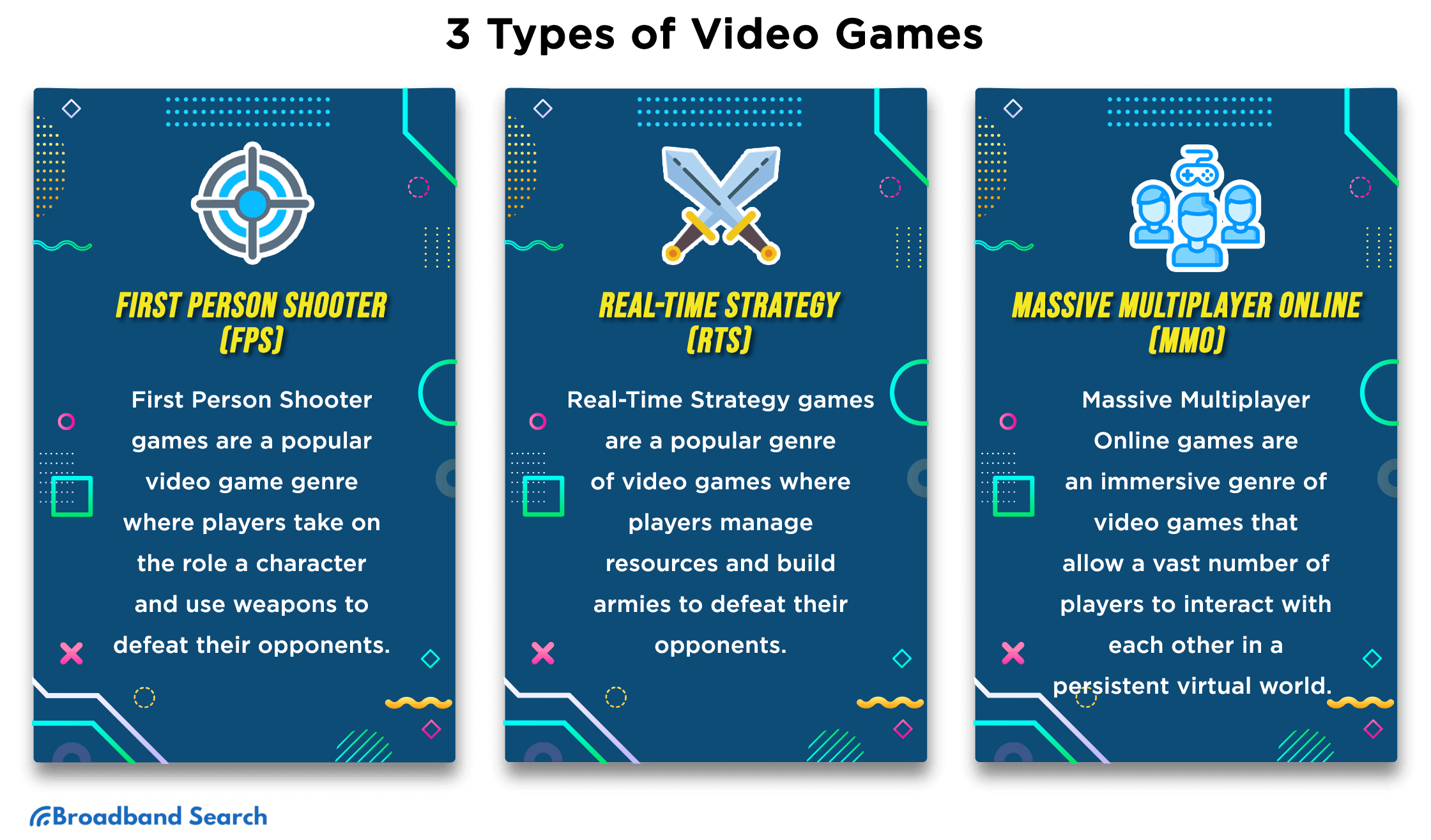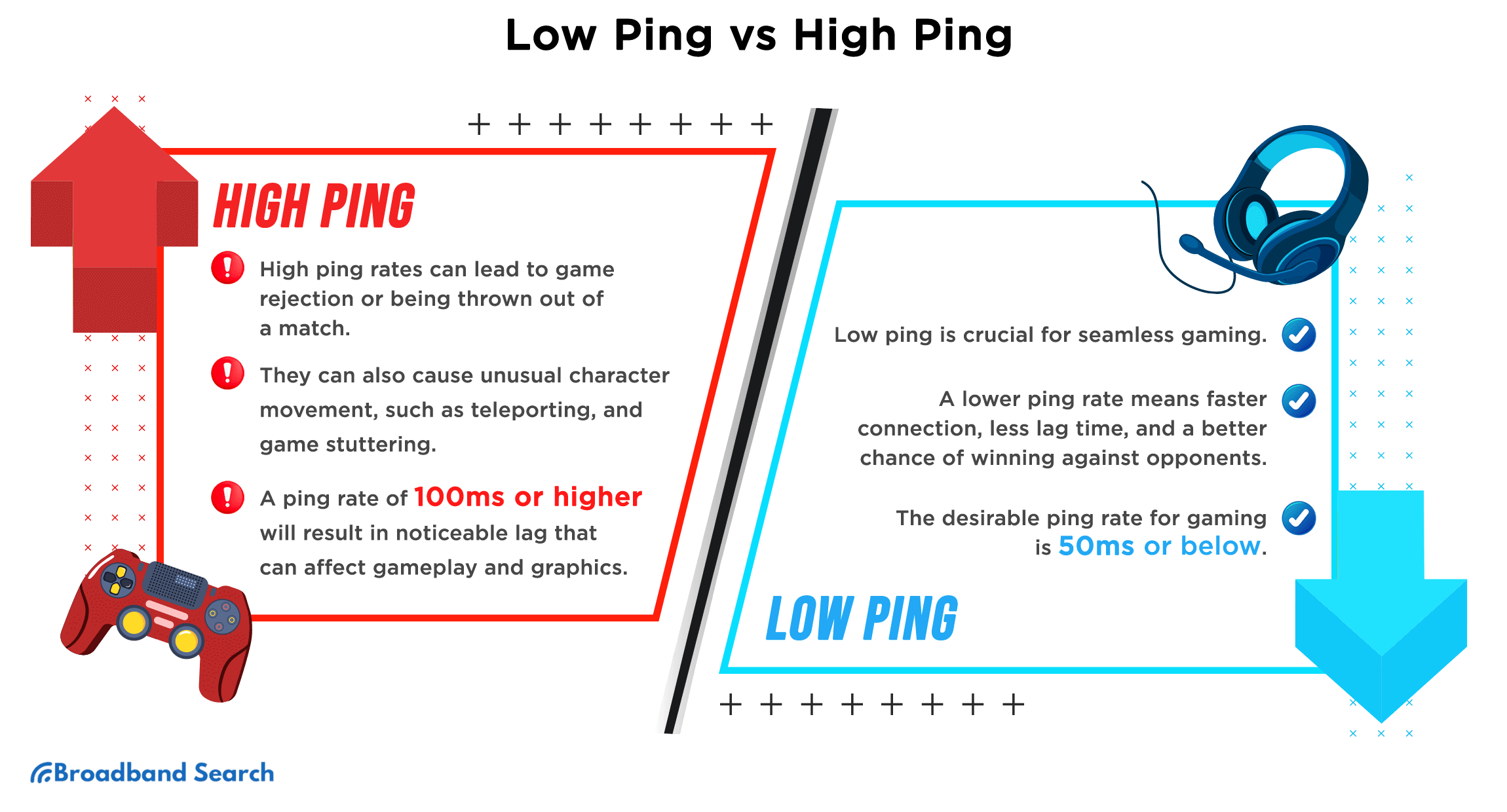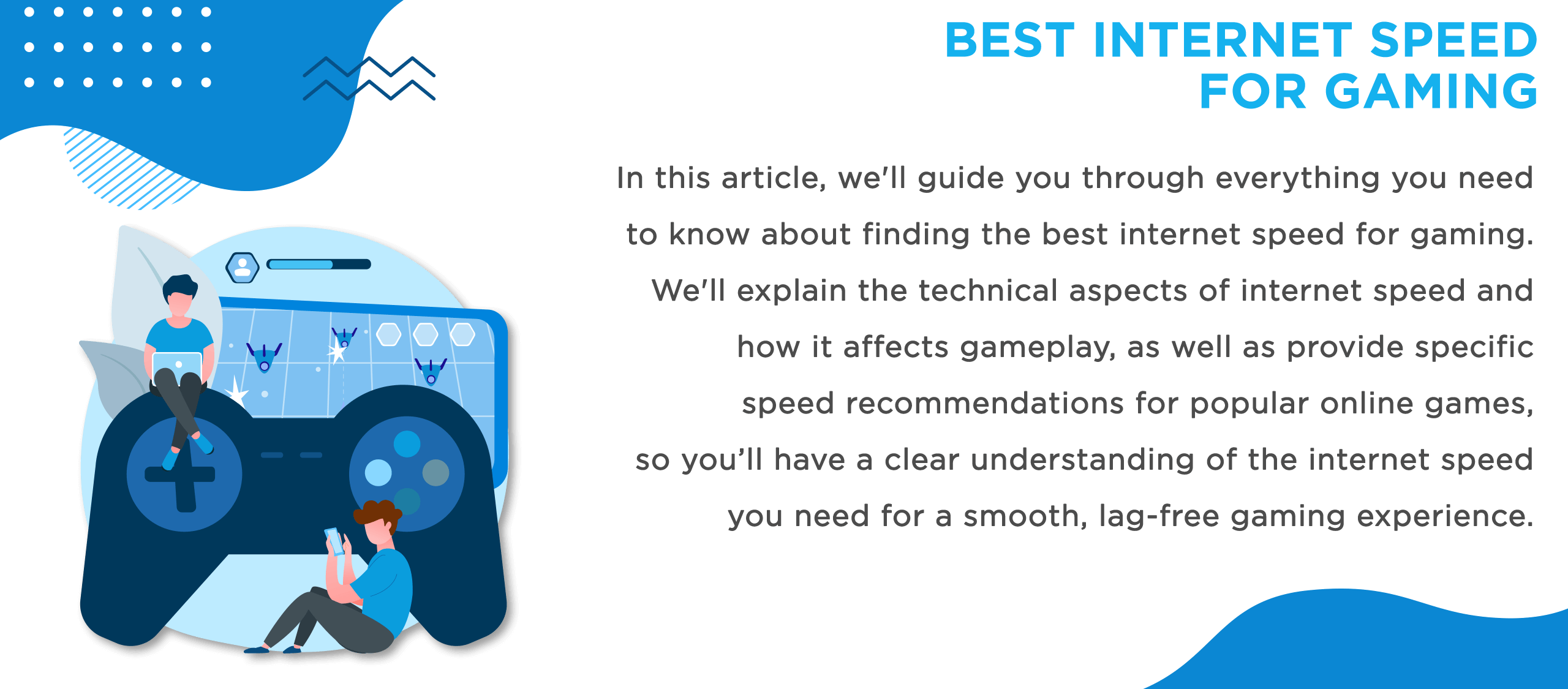As a gamer, you've likely experienced the frustration of slow internet hindering your ability to enjoy your favorite games. Teleporting enemies in Minecraft or delayed button reactions in first-person shooters are just a few examples of how lag and slow speeds can ruin your gaming experience. However, with so many internet plans available, it can be challenging to determine the ideal internet speed for your gaming needs.
In this article, we'll guide you through everything you need to know about finding the best internet speed for gaming. We'll explain the technical aspects of internet speed and how it affects gameplay, as well as provide specific speed recommendations for popular online games, so you’ll have a clear understanding of the internet speed you need for a smooth, lag-free gaming experience.
How Much Internet Speed Do I Need For Gaming?
Whether you're playing on a mobile phone, gaming desktop, or console, each device has specific internet speed requirements based on its hardware specifications and the games it supports. For competitive gaming enthusiasts, these requirements are even more demanding due to the fast-paced nature of these games and the need for real-time reactions, making a high-quality internet connection crucial for optimal performance.
Recommended Internet Speed by Device

Xbox One
- Minimum download speed: 3 Mbps
- Recommended download speed: 25 Mbps
- Minimum upload speed: 0.5 Mbps
- Minimum ping as the recommended latency for smooth gaming: <150ms
With the minimum download speed of 3 Mbps on Xbox One, you can still play online games, but you may experience longer loading times and occasional lag. For example, it may take up to 30 seconds to load a level in a game like Call of Duty. However, if you reach the recommended download speed of 25 Mbps, you can expect smoother gameplay, faster loading times, and better performance overall. With 25 Mbps, you can download a 20 GB game in less than an hour and stream 4K video without buffering.
In terms of Xbox cloud gaming, you'll need at least 20 Mbps download speed and a 5GHz Wi-Fi connection for an entry-level experience. While the 2.4GHz frequency offers a longer range, its lower bandwidth and susceptibility to interference from other devices may lead to slower connections and lag during gameplay. In contrast, the 5GHz frequency delivers higher bandwidth and reduced interference, resulting in faster, more stable connections. Faster speeds will provide a more stable connection, lower latency, and reduce issues like screen tearing and blank screens.
Playstation 5
- Minimum download speed: 3 Mbps
- Recommended download speed: 50-100 Mbps
- Minimum upload speed: 1 Mbps
- Minimum Ping: <150 ms
The PlayStation 5 requires the highest recommended download speed of all the gaming devices due to its advanced hardware and support for AAA games. Graphically intensive games such as "Demon's Souls," "Ratchet & Clank: Rift Apart," and "Returnal" require faster internet speeds for a smooth and uninterrupted gaming experience. For example, "Demon's Souls" requires a minimum download speed of 15 Mbps and a recommended download speed of 70 Mbps for online play. Without the recommended download speed, players may experience slow loading times, lag, and disconnections during multiplayer matches.
To fully utilize the PlayStation 5's capabilities, it's recommended to have download speeds of at least 50-100 Mbps. This is especially important when using PlayStation Now, Sony's game streaming service that lets you play PS4, PS3, and PS2 games on the PS5. Sony recommends a minimum download speed of 5 Mbps to use PlayStation Now, but with download speeds of 50-100 Mbps, gamers can access its on-demand library of games with ease, even when other devices are using the internet at the same time.
Nintendo Switch
- Minimum download speed: 3 Mbps
- Recommended download speed: 25 Mbps
- Minimum upload speed: 1 Mbps
- Minimum Ping: <150 ms
The Nintendo Switch is designed to be a portable gaming console, which means it is optimized to use less data than other gaming devices. It also doesn't support graphically-intensive games like the PlayStation 5 or Xbox Series X/S, which means it doesn't require the same internet speeds to provide a smooth gaming experience.
In addition, many of the popular games on the Switch, such as Animal Crossing: New Horizons and The Legend of Zelda: Breath of the Wild, are single-player experiences that don't require a fast internet connection. This is why the recommended download speed for the Nintendo Switch is lower compared to other gaming consoles. However, if multiple devices are connected to the same network, such as other gaming consoles or streaming devices, the recommended household speed of 40 Mbps may be necessary to ensure a stable and fast internet connection for all devices.
PC Gaming
- Minimum download speed: 3 Mbps
- Recommended download speed: 20 Mbps
- Minimum upload speed: 1 Mbps
- Minimum Ping: <150 ms
PC games can be some of the most demanding games available due to their advanced graphics, complex mechanics, and real-time gameplay. For most games, users won’t experience any noticeable lag as long as you reach the minimum recommended ping. However, more competitive games such as Dota 2 and Call of Duty require a ping rate under 50ms to provide users with a desirable experience. For example, online multiplayer games like Overwatch and Valorant require a stable and fast internet connection with a low latency of around 30 ms or less to avoid lag and remain competitive. Meanwhile, games like World of Warcraft and Final Fantasy XIV require a stable connection with a recommended download speed of at least 10 Mbps for smooth and uninterrupted gameplay.
The recommended download speeds for PC gaming accounts for the need to download large game files, updates, and patches regularly, as well as to stream games through services like Google Stadia or GeForce Now. With this speed, players can expect minimal loading times and smooth gameplay in most PC games, even those with high graphical demands.
Recommended Internet Speeds for Each Game Type
While internet speed requirements for gaming devices can vary based on the device, the type of game you play can also have an impact on what internet speed is required for the best possible experience. Different types of games such as first-person shooters, multiplayer games, and open-world games have different requirements for internet speed and latency, depending on their gameplay mechanics.

First Person Shooter (FPS)
- Download Speed: 30 Mbps
- Upload Speed: 1 Mbps
- Ping rate: 15 ms
FPS games are a popular video game genre where players use weapons to defeat their opponents. To react quickly and avoid being defeated, players need low latency, making fast internet speeds crucial. Some popular FPS games that require fast internet speeds and low latency include Call of Duty: Modern Warfare, Overwatch, Rainbow Six Siege, and Counter-Strike: Global Offensive. For competitive play, it's recommended to have at least 50 Mbps of internet speed to ensure a fantastic gaming experience.
Real-Time Strategy (RTS)
- Download Speed: 3 Mbps
- Upload Speed: 1 Mbps
- Ping rate: 150 ms
Real-Time Strategy (RTS) games are a popular genre of video games where players manage resources and build armies to defeat their opponents. While fast internet speeds are crucial for consistent game performance, the ping rate requirements for RTS games are significantly less compared to other genres. The reason for this is that RTS games don't require split-second reaction times like FPS games, but rather, a stable connection is necessary to avoid lag and delays that can impact strategy and decision-making.
Some popular RTS games that require a download speed of at least 3 Mbps, an upload speed of at least 1 Mbps, and a ping rate of 150 ms include Starcraft II, Age of Empires II: Definitive Edition, Company of Heroes 2, and Civilization VI.
Massive Multiplayer Online (MMO)
- Download Speed: 5 Mbps
- Upload Speed: 1 Mbps
- Ping rate: 150 ms
Massive Multiplayer Online (MMO) games are an immersive genre of video games that allow a vast number of players to interact with each other in a persistent virtual world. These games typically require more flexibility in speed requirements compared to other genres due to the less critical nature of split-second reaction times. In contrast to FPS games that encounter issues at 50 ms, MMOs tend to be less sensitive to higher ping rates, while turn-based games are hardly affected. In MMO games, players can engage in either Player Vs Player (PVP) or Player Vs Environment (PVE) aspects, and each mode requires different ping rates. For PVP, it's recommended to have a ping of less than 150 ms, while for PVE, the ping can increase up to just below 250 ms.
Some popular MMO games that require a download speed of at least 5 Mbps, an upload speed of at least 1 Mbps, and a ping rate of up to 150 ms for PVP and just below 250 ms for PVE include World of Warcraft, Final Fantasy XIV, Guild Wars 2, and Elder Scrolls Online.
Beyond Internet Speed: The Impact of Latency And Ping on Gaming Performance
Latency, also known as ping, is one of the most critical factors to consider when it comes to gaming performance. It refers to the time it takes for data to travel from your gaming device to the game server and back. A low latency rate means that data is transmitted quickly, while high latency indicates a delay in data transmission, resulting in lag and other issues that can affect gameplay.
It is more important to focus on latency rather than internet speed when it comes to gaming performance. A fast internet connection can help, but if the latency rate is high, it can still result in a poor gaming experience. This is because even with a fast internet speed, the delay in data transmission can cause input lag, stuttering, and other issues that can impact gameplay.
To better understand the impact of latency on gaming performance, let us look at examples of low and high ping. These demonstrate how even a small difference in ping can make a significant difference in gameplay, affecting everything from movement and aiming to overall game responsiveness.

Low Ping
In an FPS game like Call of Duty, with low ping, you can quickly aim and shoot at an opponent without any noticeable delay. This is crucial when playing in a competitive match where every second counts. With low ping, you can also move around the map more smoothly, react to changing situations faster, and avoid getting killed by opponents.
In an MMO game like World of Warcraft, low ping means that you can easily dodge enemy attacks, use your abilities more precisely, and interact with other players more seamlessly. With low ping, you can also quickly respond to events in the game world, complete quests more efficiently, and participate in raids and battles with minimal delay.
High Ping
In the same FPS game, with high ping, you might experience a noticeable delay between when you aim at an opponent and when your shot hits. This can result in missed shots or even getting killed before you can react. With high ping, you might also experience rubber-banding, where your character moves back and forth uncontrollably, making it difficult to move around the map or complete objectives.
In the same MMO game, with high ping, you might experience a delay in using your abilities or spells, which can make it difficult to time your attacks or heals correctly. With high ping, you might also experience lag spikes, where your character freezes in place or jumps around the screen, making it difficult to navigate the game world or participate in battles.
Consider Switching to Fiber to Level Up Your Gaming Experience
There are several types of internet connections available today, including cable, DSL, and fiber. Fiber internet is a more advanced technology compared to cable or DSL, and this is what makes it the preferred choice for gamers. With its use of optical cables, fiber internet is capable of transmitting data packets more efficiently, resulting in lower latency and faster speeds. This, in turn, creates a more flawless gaming experience. However, this advanced technology comes at a higher price due to the significant investments required in infrastructure and maintenance.
- High download and upload speeds of up to 1 Gbps. Download speeds are essential for quick game downloads, updates, and smooth streaming of gaming content. This is particularly important for online games that require frequent updates and patches, such as MMOs and online shooters. Additionally, high download speeds are crucial for downloading games, as large file sizes can take hours to download on slower connections, resulting in delayed gameplay.
- High bandwidth of up to 1000 Mbps. Having sufficient bandwidth provides enough capacity to support multiple devices and users simultaneously, without slowing down your gaming performance. This is particularly important for households with multiple gamers or users who stream high-definition content simultaneously.
- Low jitter. In gaming, jitter refers to the variation in delay between the delivery of data packets, which can cause inconsistency in gameplay. For example, in first-person shooter games, high jitter can result in delayed reactions to in-game events, making it difficult to react quickly to changing situations.
- Low packet loss of less than 1%. Packet loss in games can result in missing or delayed information, leading to gameplay that feels choppy and inconsistent. For example, in racing games, packet loss can result in cars jumping around on the track or appearing in the wrong location, making it difficult to navigate and maintain control.
- Low latency of less than 5 ms. Having low latency means that users will experience minimal delay between their actions and the response from the game server, resulting in a more responsive and immersive gaming experience. For example, in a game like Call of Duty, where quick reflexes and precision aim are essential, even a small delay in the response time can mean the difference between a kill or getting killed.
The Bottom Line
Smooth gameplay requires a reliable internet connection, and when it comes to gaming, speed is not the only important factor. The best gaming experience comes from a combination of good speeds and low latency. While the best internet speed for gaming depends on the user's hardware and the type of game they play, a fast internet speed with at least 3Mbps and 150ms ping is recommended for most games.
By opting for fiber-optic internet, gamers can avoid various issues that can hamper their gaming experience, such as lag spikes, slow download and upload speeds, and unstable connections. With fiber's high-speed capabilities and low latency rates, gamers can enjoy lag-free gameplay, instant response times, and consistent performance.
If you're looking to upgrade your internet connection, head to Broadband Search to find and compare ISPs that offer fiber in your area.
FAQ
Why is my game lagging?
Your game could be lagging for a few reasons. Slow internet and reaching your data cap are among the most common.
Is satellite internet good for gaming?
There’s no question that satellite internet is fast enough for online gaming–reaching speeds of 100 Mbps. Despite this, however, satellite internet has been known to have high latency. This could be problematic in an online gaming experience.
What is the best router for gaming?
In the current market, the best routers for online gaming are the Netgear Nighthawk Pro Gaming 6-Stream WiFi 6 and the Asus RT-AX82U.
Is 100 Mbps enough for gaming?
Yes. Considering it’s recommended that you have at least 25 Mbps, this goes above and beyond. If you’re still having trouble, it may be due to another problem.
Why is my internet speed slow at night?
This is due to network congestion during peak hours. Too many people are trying to access the game at the same time.

